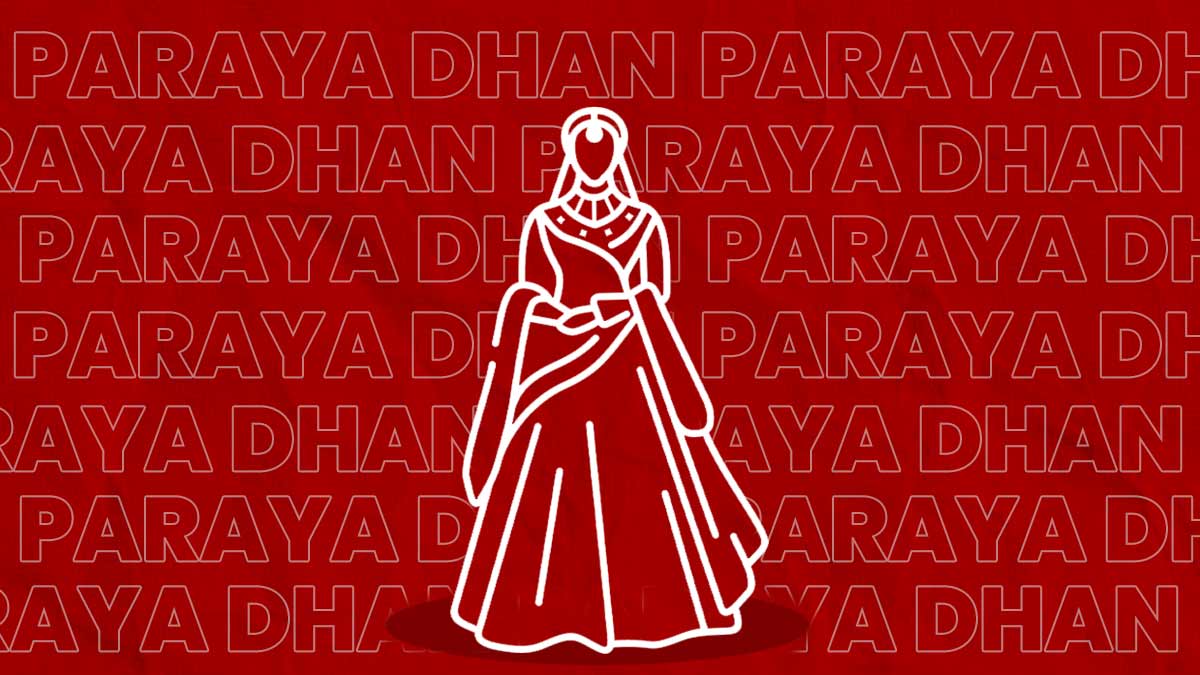
When I first asked my grandma why she'd call me 'paraya dhan', she told me I was born a girl and as soon as I will be of age, I will be “handed over” to my husband and in-laws, my real family. She called me 'amaanat', a prized possession because I was born to be another family's wealth.
This mindset was there in the air of our home for as long as I remember. My grandma, parents, and relatives all had the same notion of me and all the other daughters of the family. While I got to hear it now and then growing up, it came with a disclaimer, “...not today, there is time but you will eventually have to go to your real family, the people you belong to.”
If you were wondering if terms like paraya dhan existed only in the rural parts of the country, let me burst your bubble. It is everywhere, across every nook and corner of the country. As girls grow up, they are schooled on everything, right from cooking food to making their beds to setting the almirah – not so that they are self-sufficient independent adults, but so that going forward they can successfully manage their husband's homes. On the other hand, the sons are trained to manage the household finances, or take over the family businesses if there is one. The parents are banking on them, and the idea is ingrained in their minds from a very young age.

There were times when I would offer help with the little things at home, bill payments, speaking to the cable operator, heading out to get groceries, repair help and I would hear "you leave it, your brother will do". This isn't just my story, it is every girl's tale who was born and brought up in a household where daughters were considered somebody's amaanat.
Even after I got married, things didn't change drastically for me. Every time I visited my maternal home, my mother would ask me to rush back quickly citing that I was paraya dhan and it wasn't a good idea to stay out for long.
During his last days, my father was hospitalised. I was staying at my maternal home. My brother and I would be outside the ICU all day long and head back home once he was asleep. My father would often tell me that he was better and I should go back to my husband's home because according to him it wasn't a great idea to be at the maayka for this long. I would refuse and then he would tell my brother to drop me back home.
Don't Miss: Being A Brown Daughter: When I Was Asked To Ditch Outfits That Were 'Too Modern'
The consequences weren't odd, not for my family at least. However, for me, the stereotype took away a lot from me, especially in terms of my freedom. I wasn't allowed to stay out late at night, weekend getaways, overnight stays with friends, and school trips were a big no-no.

'Good girls don't stay out at night', 'It is unsafe to be outside at night, what if something happens', 'Go for trips with your husband once you are married', 'No one will question you stepping out at night after you are married', ‘Learn to cook now or you will regret once you are married’, ‘Your in-laws might not allow you to work after marriage’, ‘Your husband might not like such fashion choices after you are married’, my family had the most bizarre things to say but were they convincing enough? None.
Don't Miss: Being A Brown Daughter: When I Was Taught To Serve Food And Eat Last
Even though my parents, and my family love me unconditionally, I just wish the paraya dhan mindset wasn't so deeply entrenched in their minds. The stereotypical notions of society continue to exist and I am sure they won't change anytime soon. However, I always say, change begins with us. Today, I am a mother to a daughter and in the years going forward, I won't ever belittle my daughter by giving her the paraya dhan talk. Being born as a girl doesn't make her any less of a human being and she deserves to enjoy an equal space like any other.
Also watch this video
Herzindagi video
Our aim is to provide accurate, safe and expert verified information through our articles and social media handles. The remedies, advice and tips mentioned here are for general information only. Please consult your expert before trying any kind of health, beauty, life hacks or astrology related tips. For any feedback or complaint, contact us at [email protected].